A Road to Shared Prosperity: The Path Paved in Richmond in Building Solidarity Toward Shared Wealth in SMCs
Written By Jessica L. González Martínez
Small and Midsized Cities (SMCs) – defined as populations from 50,000 to 500,000 – can leverage their small size, ease of accessibility to leaders, less bureaucratic structures, and close-knit community ties to be transformative catalysts for equitable and inclusive local economic growth. In NGIN’s earlier insights, we’ve underscored the importance of strategic alliances across community and economic development and aligning an inclusive agenda across three essential pillars: commitment, capacity, and capital. Applying principles of equitable economic development for actualizing wealth, especially among Black, Indigenous and People of Color (BIPOC) in SMCs is not just an option in economic development but a clear and pressing need.
As we continue to champion the need for inclusive growth strategies and actions, we are driven to reflect on the following realities that exist for SMC leaders:
Leaders in communities attempted to be served/reached/supported find it challenging to identify points of engagement with local government and community institutions
Leaders from community and economic development must constantly remind and celebrate the progress achieved thus far in creating momentum for inclusive growth models
Local leaders are incubating their solutions via affinity groups/organizations guided by and alongside their members; racial and/or demographic guideposts shape many of these groups
Cross-jurisdictional partnerships are being attempted with no blueprint, resulting in building allyships with leadership in their ecosystem as an area of growth and opportunity as none were previously established.
NGIN hosted a delegation of city leaders from 5 different U.S. cities in Richmond, Virginia, in Fall 2023 to learn about inclusive growth models being utilized there, especially how local leaders are organizing and advocating for more equitable growth models. Richmond’s dynamic ecosystem has afforded leaders across city, nonprofit, regional, political, and grassroots organizations to find resonance around one essential vision: how do [we] build a practice of shared prosperity that enhances equitable outcomes for communities of color? Richmond has a deep commitment to this effort, starting its journey in 2011 to develop and implement a coordinated strategy aimed at broadening socio-economic opportunity and reducing the city’s poverty rate through a “community wealth-building” framework (Williamson, University of Richmond). Democracy Collaborative, a national nonprofit, sparked this term into the field in 2005 to describe economic development strategies aimed at deliberately broadening ownership and wealth generation opportunities across communities. They have since leveraged their learnings to explore additional proactive methods that encourage programmatic solutions alongside policy levers. The Action Guide for Advancing Community Wealth Building supports local stakeholders’ plans to inform a more robust commitment to an inclusive economy.
For many SMCs, enacting a community wealth-building approach may be a bold step worth exploring. The City of Richmond, through the leadership of the Office of Community Wealth Building, has modeled what Thad Williamson, Faculty at the University of Richmond, has identified as four “principles of action”:
Inclusive and meaningful participation of communities closest to the solution should be included in the design and implementation of policies and plans
Enactment of bold equity goals that measure positive economic and health benefits for communities left at the margins, historically termed as marginalized communities
A holistic definition of “wealth” that includes financial, physical, human, and social capital, and where the community is examined through an asset framework, impacting financial, physical, social, and relational well-being
Reshape resource flows and ownership patterns through an inclusive economic development framework
Richmond’s Office of Community Wealth Building continues to explore new models to eliminate poverty outcomes in their city. In addition, community leaders have galvanized to expand this effort statewide through the Virginia Solidarity Economy Network. On a national footprint, Stacey Sutton, a Board Member at the New Economy Coalition, declares the need to seize the moment to double down in community wealth-building models by contributing to enhancing solidarity economy ecosystems. Sutton describes this effort as a deep and comprehensive approach to strengthening infrastructures, practices, and principles that prioritize people, community, and ecological sustainability.
It was this commitment to community wealth building, bringing together principles and practices of solidarity economics, and the drive of the economic and community development professionals in Richmond that inspired NGIN’s Learn, Explore, and Activate in Place (LEAP), which was a transformative experience for the 21 community and economic leaders who visited Richmond, Virginia. These leaders represented community and economic development leadership from Fort Collins, CO; Durham, NC; Sacramento, CA; Shreveport, LA; and Topeka, KS. The three-day visit allowed the delegates to witness the success of inclusive models for economic growth in action, sparking inspiration and hope for their own cities. They had the opportunity to ideate with peers and jumpstart action plans for implementation when they returned to their home cities, confident in the potential for positive change. While in Richmond, practitioners explored promising inclusive growth strategies and networked with Richmond leaders, enhancing peer relationships in communities that seek similar outcomes toward shared prosperity for their residents. Practitioners were able to explore the complexities of historical markers, which continue to share visual testimony to the disenfranchisement across ethnic and cultural community groups, dive into a deeper understanding of capital tools in a market and how they can be designed to serve populations that are least to have access, and overarching community wealth building models designed to mobilize residents out of poverty.
This culmination of learning resulted in an eyes-wide-open effect for the 21 economic and community development leaders. As they closed their time together, a light bulb was sparked, reminding them more work would need to be done when returning home. The collective made it visible that to embark on strategic action like community wealth-building, one must be ready to activate, align, and be bold to hold conversations that center lived realities of those who make up one's community. Along those efforts, community stakeholders across economic and community development – alongside grassroots movements – have an imperative to activate coalitions that bring to light the realities that a shared values model is needed and imperative to driving an explicit action to address the inequities identified in their cities.
The Richmond LEAP delegation was incredibly brave in their ability to choose to learn and be in partnership with one another while in Richmond. Their engagements inform the reality that if SMCs are to thrive, they must be intentional with the fact that collective growth should be done in partnership with models that address the need to activate empowered leadership that is willing to use their voice and actions to mobilize efforts toward inclusive growth.
As we reflect on the future of SMCs, and our time in Richmond, we stand tall to acknowledge the immense journey the city has undergone to get to where it is with its community wealth building approach. Be it the Office of Community Wealth Building at the City of Richmond or the grassroots activation of the Virginia Solidarity Economy Network, community residents, leaders, and institutions all found their way to the same shared purpose of activating wealth for those living in disheartening conditions. We believe in order to activate further progress, more coalition building should be a priority for leaders who wish to replicate and enhance what was learned in Richmond. These coalitions should align with inclusive growth outcomes outlined by economic development organizations and departments, match the interest of philanthropic investments, leverage capital tools at financial institutions, and mobilize in relationship with grassroots movements and community-based organizations. There is hope that with further refinement, many communities, including Richmond will embark on lowering the anchors and rooting themselves more deeply in relationship to be in service of equitable growth.



